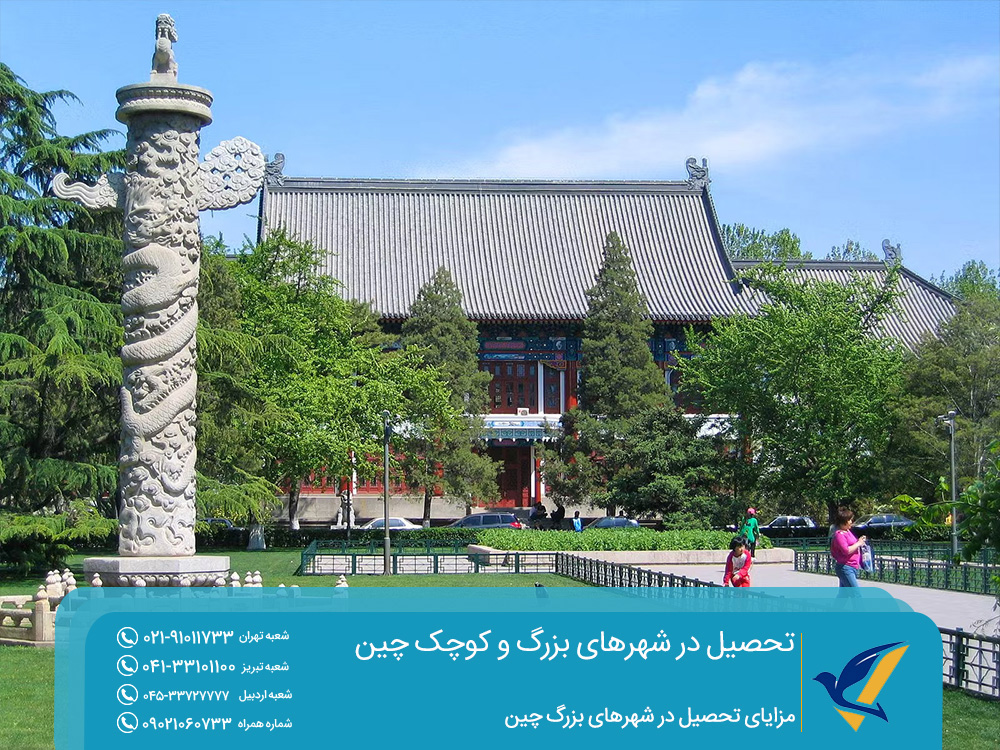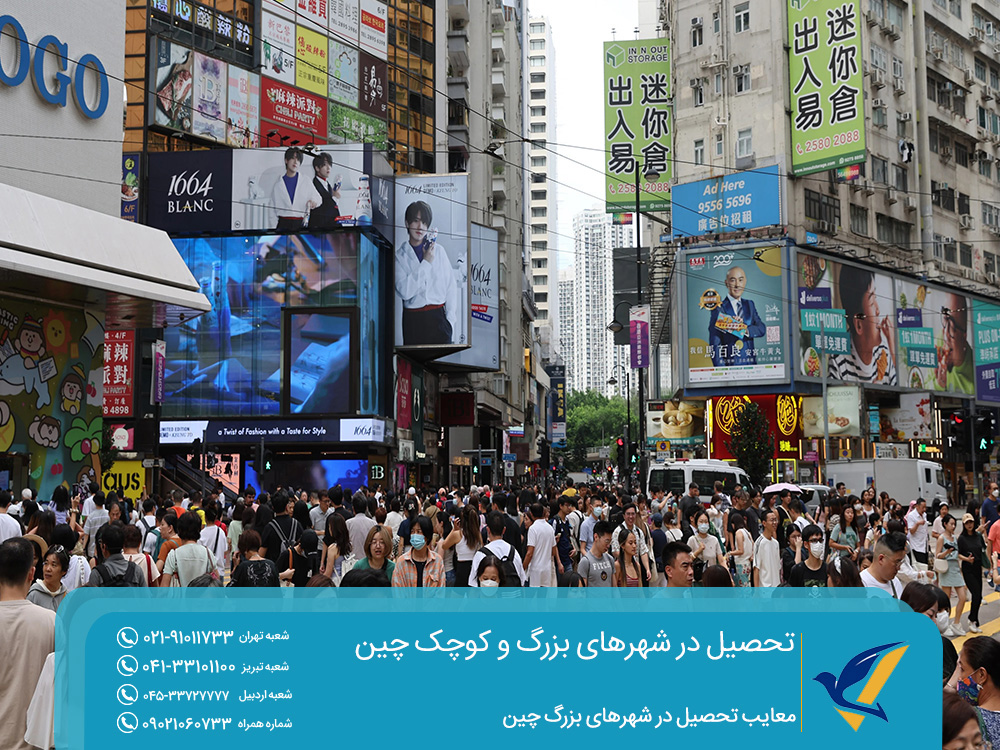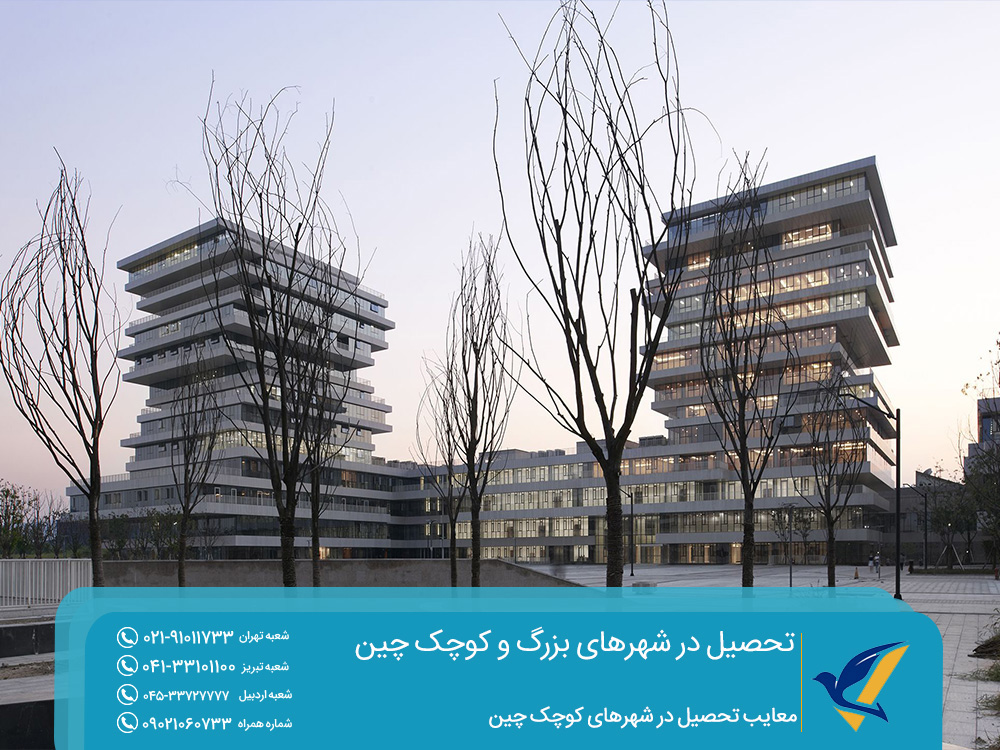Studying in both large and small cities in China offers international students a unique experience that can significantly impact their academic and professional paths. While the study conditions in China differ between large and small cities, each has its distinct characteristics, and choosing between the two can greatly affect students’ career opportunities and quality of life.
On the other hand, the advantages of studying in China’s large cities include advanced facilities, reputable universities, and greater job opportunities, which can be particularly attractive for many students. In this article from Elm Vira, we explore these aspects and aim to provide a thorough comparison of the pros and cons of each option.
Studying in Large and Small Cities in China
Studying in China’s large and small cities is a unique experience that depends on your chosen location. In major cities like Beijing, Shanghai, and Guangzhou, advanced educational facilities and world-renowned universities provide students with the chance to study in a dynamic and competitive environment. These opportunities are different from what one might experience in smaller cities. In larger cities, the cost of living is typically higher, and students should prepare for the crowded conditions and air pollution.
However, studying in these cities is appealing to many students due to the cultural diversity and the post-graduation career opportunities. On the other hand, studying in smaller cities offers its own set of benefits. These cities generally provide a quieter study environment and the cost of living is significantly lower than in the larger cities. Although there may be fewer job opportunities, the more intimate experience and closer connection with professors and peers can be beneficial for students.
Ultimately, the benefits of studying in large cities like Beijing and Shanghai include more opportunities for education, networking, and post-graduation employment, while studying in smaller cities in China offers students a more peaceful and affordable environment to focus on their studies.

Advantages of Studying in China’s Major Cities
Studying in both large and small cities in China can provide numerous opportunities for students, depending on various conditions. In larger cities, educational and career opportunities are much more extensive compared to smaller cities. One of the most significant advantages is the access to world-renowned universities located in these cities. Universities like Peking University, Fudan University in Shanghai, and Tsinghua University are considered among the best in China and the world. These institutions offer high-quality academic programs, distinguished professors, and advanced infrastructure for students.
In these cities, research and academic opportunities are supported by financial backing and extensive facilities. Studying in China’s major cities also offers multiple career opportunities alongside educational institutions. With the presence of numerous international companies, startups, and industries, students can easily access the job market and find various internship and employment opportunities.
Another advantage of studying in China’s major cities is the cultural and social diversity. Cities like Beijing and Shanghai host international students from all over the world, creating a rich cultural environment for exchanging ideas, learning about different cultures, and picking up new languages. This international setting allows students to grow not only academically but also socially and culturally.
Additionally, studying in China’s major cities provides a more comfortable lifestyle due to easy access to public transportation, shopping centers, recreational facilities, and advanced amenities. The public transportation system in these cities is highly developed. Furthermore, healthcare services are of high quality, allowing students to conveniently access medical and health services.

Disadvantages of Studying in China’s Major Cities
While studying in large cities in China may offer many advantages, these cities also present unique challenges that graduates must face. One of the primary challenges is the high cost of living in these cities. Cities like Beijing, Shanghai, and Guangzhou, due to their large populations and advanced economic conditions, have a high cost of living. Rent, transportation, food, and other living expenses can be burdensome for students, especially those without scholarships or financial support.
Another disadvantage of studying in China’s major cities is the overcrowding and air pollution. Due to the large populations and extensive industrial activities, these cities face problems like heavy traffic and air pollution. This not only impacts the quality of life in these cities but can also affect students’ physical and mental health. Additionally, living in such environments may cause stress and anxiety for students.
Alongside these issues, students in major cities face intense competition for admission to specific programs or finding job opportunities, due to the presence of prestigious universities and large populations. This competition can create additional pressure and may reduce opportunities for personal and professional growth.
Furthermore, due to the high cultural and social diversity in these cities, some international students may experience cultural adjustment problems. While this environment offers many learning opportunities, it can be challenging for those coming from smaller countries or different cultural backgrounds to feel integrated into the large urban society. This can be especially problematic for those who are new to China and not yet fluent in Chinese.

Advantages of Studying in China’s Smaller Cities
Studying in both large and small cities in China brings significant differences in terms of job opportunities, costs, and levels of competition. In smaller cities, these advantages are typically more focused on quality of life and lower costs. Compared to larger cities like Beijing and Shanghai, housing, transportation, food, and other daily necessities in smaller cities are much cheaper. This makes them an attractive option for international students seeking more affordable study conditions in China. In smaller cities, reasonable living amenities combined with lower costs make student life economically viable.
Additionally, one of the biggest advantages of studying in smaller cities in China is their quieter, less competitive environment. These cities typically have smaller populations, and the hustle and bustle found in larger Chinese cities is less prevalent. This setting allows students to focus more on their studies and research. The academic competition in smaller cities is less intense compared to major cities, which is particularly beneficial for students looking for a less stressful educational experience. Moreover, in these cities, due to the smaller population, students have more opportunities to establish closer relationships with professors and academic advisors.
Moreover, studying in smaller cities in China gives students the chance to experience a richer cultural immersion in Chinese life. Living in a smaller, less international city offers more opportunities to connect with the authentic culture and traditions of China. In these environments, students can better learn the Chinese language and familiarize themselves with Chinese customs through daily interactions with locals. This cultural experience can be especially valuable for those seeking a more authentic experience of life in China.

Disadvantages of Studying in China’s Smaller Cities
Studying in smaller cities in China, particularly, can come with many limitations regarding access to global job opportunities. This could negatively impact the career prospects of graduates. One of the main challenges is that educational facilities in these cities are generally not as advanced as those in larger cities. While many of China’s prestigious and renowned universities are located in big cities, smaller cities may offer fewer educational resources for students. This could mean limited access to renowned professors, advanced research facilities, and workshops.
Students may not be able to benefit from the same level of educational conditions in smaller cities as they would in large cities. Additionally, the disadvantages of studying in smaller cities include limitations in job and internship opportunities. Students studying in these cities might find it difficult to secure high-paying jobs or internships in their specialized fields. Moreover, as most international students are concentrated in larger cities, networking and building professional connections can also be more restricted.
In comparison to studying in large cities, another disadvantage of studying in smaller cities is the lack of cultural diversity and international opportunities. Larger cities are known for their ethnic and cultural diversity, providing students with the opportunity to live in an international environment. However, smaller cities may have less diversity, limiting students’ exposure to different cultures. This could reduce opportunities for cultural exchange and networking.
Another drawback of studying in smaller cities in China is the lack of certain recreational amenities that are available in larger cities. Smaller cities usually do not offer the same range of amenities, such as large shopping centers, international restaurants, cinemas, and diverse entertainment options, as big cities do.

Review of the Education System in China’s Large and Small Cities
An examination of the educational system reveals differences in quality, structure, and resources between studying in large and small cities in China, which can significantly impact students’ academic experience. The education system in China’s large cities is generally more international and advanced, offering abundant opportunities for research and learning. On the other hand, the educational system in smaller cities tends to be quieter and more limited in resources, but it may offer a more personalized experience with a focus on practical education.
Choosing between these two depends on the preferences of students planning to migrate to China. Here’s an overview of the educational systems in both types of cities:
1. The Educational System in China’s Large Cities
In large cities like Beijing, Shanghai, and Guangzhou, the educational system is generally more advanced, with richer resources and facilities. These cities host some of China’s most prestigious and internationally recognized universities, which are also ranked highly on global scales. These universities attract international students, distinguished professors, and specialized researchers, offering advanced research facilities and scientific resources.
Students in large cities gain access to high-quality educational materials, cutting-edge laboratories and workshops, up-to-date academic programs, and international collaborations after being accepted into these universities.
Moreover, these cities have large research centers and academic partnerships with top global universities, providing numerous research opportunities. Therefore, studying in these cities can be highly beneficial for students seeking to engage in research in specialized fields.
However, these resources and facilities come at a cost. Studying in large cities in China usually involves higher living expenses, including accommodation, transportation, and tuition fees. Additionally, due to the large number of students and intense competition, there may be fewer opportunities for personalized connections with professors and academic advisors.

2. Education in Large and Small Cities in China: The Educational System in Small Cities
In contrast, the educational system in small cities in China tends to be more locally focused and operates with fewer resources. These cities usually have smaller universities with lower rankings compared to those in large cities. These universities may have fewer research facilities than those in larger cities and tend to focus more on practical training and large lectures. This means students may not have access to the advanced facilities available in large cities and may face fewer opportunities for research projects.
However, studying in small cities in China can be ideal for those seeking a quieter and less competitive environment. In these cities, interactions between professors and students are typically more frequent, allowing students to benefit from more personalized mentoring. On the other hand, the educational experience in small cities might come with challenges such as limited job and internship opportunities. Many international companies and attractive job prospects are concentrated in larger cities, meaning students in small cities may not be able to take advantage of these opportunities.
3. Differences in Teaching Methods and Curricula
When it comes to education in large versus small cities in China, the curricula in large cities are typically designed around modern teaching and research methods, and they are often aligned with international standards. This is particularly evident in specialized fields and advanced degree programs such as master’s and doctoral studies. In these cities, the use of educational technology and modern teaching approaches is more common. However, in smaller cities, teaching methods may be more traditional, and some of these universities may have fewer resources to create advanced educational experiences.

4. Access to International Opportunities and Networking
Studying in large cities in China provides many opportunities for students to establish international connections and network. In these cities, the presence of international students and numerous collaborations with universities outside of China allows students to benefit from diverse experiences and cultures. In contrast, in smaller cities, similar opportunities for international interactions may be less frequent.
Impact of Studying in Different Chinese Cities on Post-Graduation Careers
Studying in large and small cities in China can have very different impacts on the career life of graduates. The effects can vary significantly depending on whether the students studied in large or small cities. Below, we examine the impact of studying in these two types of cities on professional life.
1. Impact of Studying in Large Cities in China
Studying in large cities, especially in major urban areas like Beijing, Shanghai, and Guangzhou, can have a highly positive impact on the career life of graduates due to the abundance of job opportunities, strong networking, and the presence of international companies. These cities generally host larger corporations and industries that are often looking to recruit graduates from prestigious universities. Therefore, selecting the right university in China is essential, as these universities tend to be more competitive and offer advanced educational facilities.
Graduates from large cities in China benefit from many advantages, such as access to international job opportunities, exposure to global companies, and various fields of expertise. However, due to the large number of professionals competing for jobs, the competition for finding employment in these cities is intense. Graduates need to possess specific skills and competencies to stand out from their competitors.

2. Impact of Studying in Small Cities in China
On the other hand, studying in smaller cities in China can have a different impact on graduates’ careers. Although job opportunities may be fewer in these cities, the less competitive environment can sometimes make post-graduation career advancement easier in certain fields. Particularly for those looking to start their own businesses, studying in smaller cities can provide opportunities to identify local needs and begin entrepreneurial activities. With smaller populations and less-developed needs in these areas, graduates may enter the job market faster and even find more opportunities in management and leadership positions.
Additionally, the lower cost of living in smaller cities allows graduates to start with lower-paying jobs but enjoy a more comfortable lifestyle with less financial pressure. However, it is important to note that in these areas, graduates might not have access to as many international career growth opportunities, which could limit their access to global job prospects.
Conclusion
Ultimately, studying in large and small cities in China is heavily influenced by the choice of location. The academic environment in larger cities is typically more competitive, but the benefits of studying in these cities include more job opportunities, superior educational facilities, and stronger networking that can contribute to professional advancement. In contrast, studying in smaller cities may be associated with lower living costs and less competition, but there may be fewer global job opportunities. Overall, the decision depends on each student’s career goals, budget, and personal preferences.
Elm Vira is a reputable educational migration institution that helps students choose their ideal university for further studies with a fresh approach and successful experiences. The institution offers free expert consultations and full support, making the complex process of educational migration easier for students.
میانگین امتیازات 5 از 5
Vote count: 1 Vote